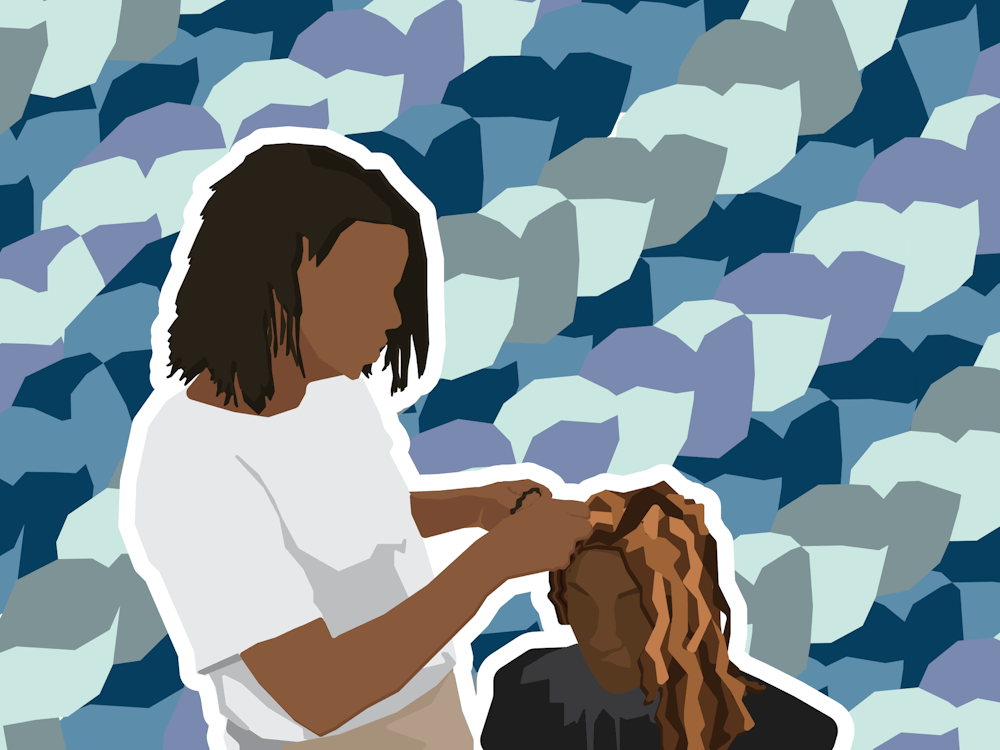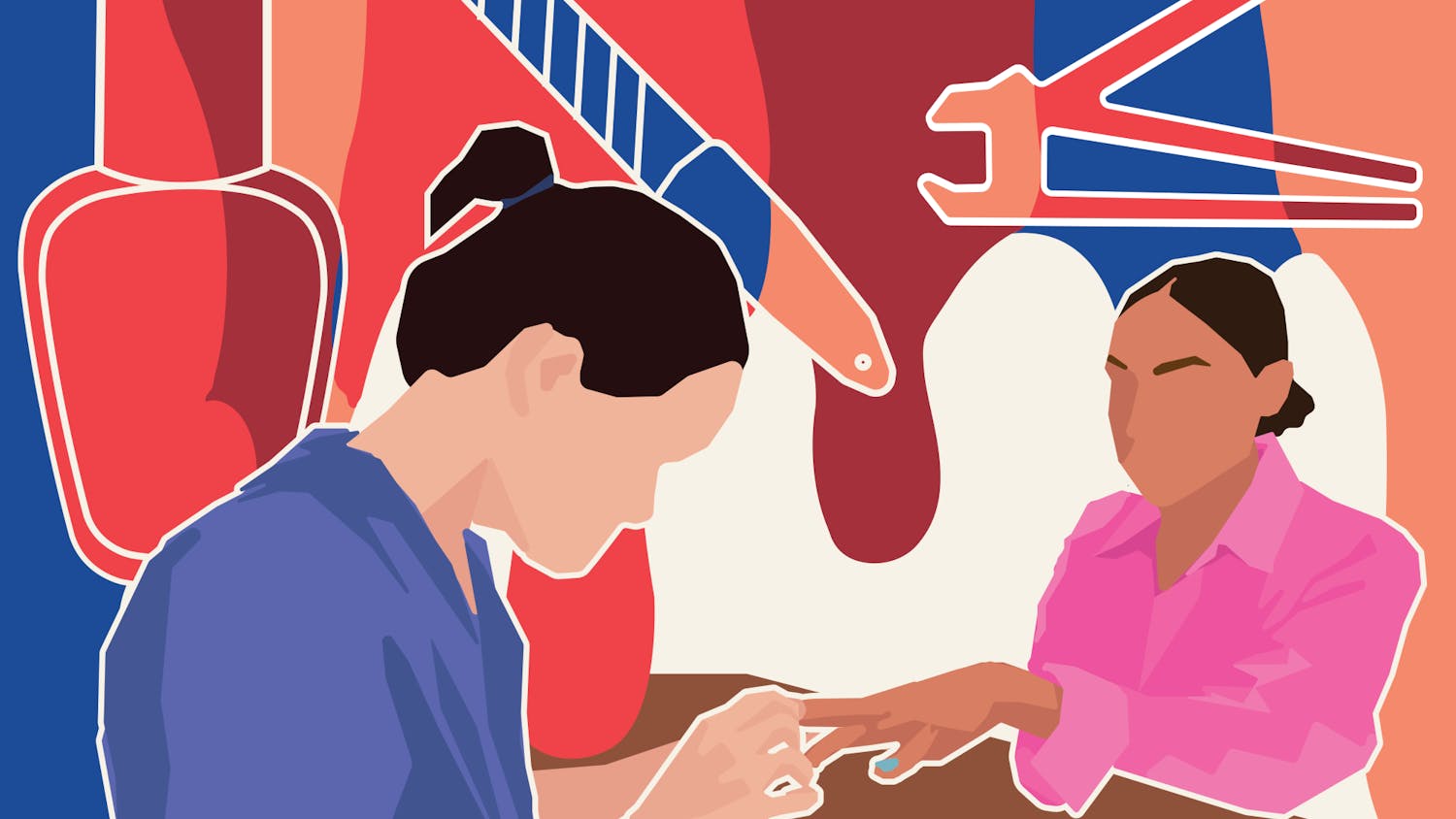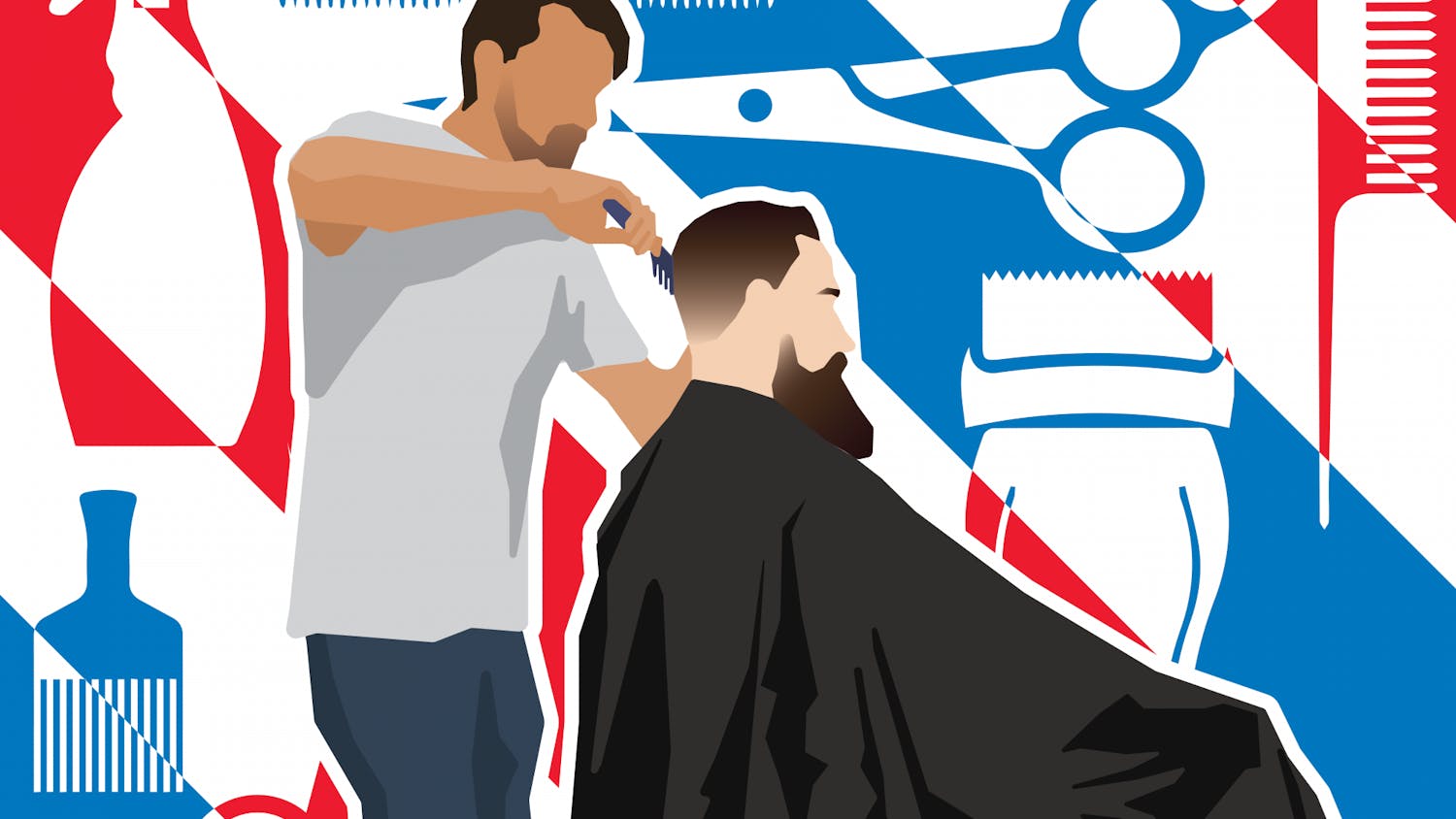Editor’s Note: This is the third story in a series about Gainesville’s beauty industry.
Looking good takes time. Hair braiders understand this more than most. They will spend hours, sometimes days locking hair into the perfect strands.
They have different titles from stylist to cosmetologist to beautician. Nonetheless, they all offer the same service: their passion in hopes others find their confidence.
Temeka Parker
There is a little girl squirming in the salon chair. She’s been there for several hours. Every few minutes she asks to go to the bathroom while a half-empty can of soda waits on a table nearby. The room smells of hair gel and shampoo.
Sitting patiently behind her, fingers flying to finish another braid, is Temeka Parker, a 42-year-old full-service cosmetologist at A Nu Twist, located at 1031 NW Sixth St. From braiding cornrows to making her own wigs, Parker has a variety of skills that are useful in the hair industry. She can also dye hair and give haircuts.
Parker has styled hair since she was in ninth grade. After high school, she joined the Air Force for five years before returning to the world of hair braiding.
She always knew she would go back to styling hair. It’s her passion, she said.
“If I didn't have to make a living out of it, I would do it for free and still be fine,” she said.
More than just a service, styling hair offers the opportunity to learn about and from new people.
Since going to hair school in Jacksonville, she kept several loyal clients until she moved to Gainesville in April.
Though she’s only been in Gainesville for a few months, she has more than 20 years of professional experience that leaves nearly every customer satisfied. She hopes to start a non-profit organization to take client satisfaction a step further.
The organization will provide free hair services to domestic abuse shelters, addiction treatment centers and veterans. However, she also plans on getting professional life coaches and therapists to volunteer to help those struggling with mental health.
“When they're walking out, they're not feeling good just on the outside, they're feeling good on the inside,” she said.
That is her favorite part — seeing people happy with their services.
“I like to see the end result and the response I get from people who like their hair,” Parker said.
As Parker presented the mirror and revealed the final look, the little girl smiled and squealed with joy. After she ran her fingers through her new hair, the little girl turned to Parker and made one last request.
“Can I have a hug?” she asked.
Omolola Akala
Many people say home is where the heart is. But to Omolola Akala, a 33-year-old beautician, home is where she gets to braid hair. She wants her chair to feel comfortable to others.
“I always make sure they have maximum satisfaction because that's what is paramount to us here,” she said.
If she is working by herself, braiding can take around 6 hours, but that can change depending on the hairstyle. Because it takes so much time, she tries to make everyone feel at home, often offering food, drinks or phone chargers.
Akala considers herself to be more introverted but doesn’t mind making the effort to speak with customers, especially if it makes clients more comfortable. She doesn’t just make other people feel at home. Styling hair also makes her feel closer to home.
Akala grew up in Nigeria but came to the United States to study beauty. Her mom, who used to braid hair in Africa, inspired Akala.
Hair braiding is believed to have originated in Africa, as a way to differentiate between tribes and social classes, according to Genesis Career College.
When she originally came to the U.S., she settled in Chicago. However, the weather did not agree with her, so she jumped at the opportunity to move to Florida two years ago, she said.
Once she arrived in Gainesville, she started working at Mariame African Hair Braiding located at 1113 N Main St. Since the store opened, she’s had several clients that always ask for her specifically whenever they want their hair done.
One thing Akala has noticed is that the braiding culture is different in Africa than in the U.S. They have a more communal society whereas the U.S. is more individualistic, Akala said.
While she respects clients who may not want to talk, in Africa, people don’t have as much of a choice.
“Even if you don't want to talk, they're going to make you talk,” she said. “If you don't wanna eat, they're gonna make you eat.”
The difference intimidated her at first, but the ability to pursue her passion makes it worth it.
Birdy Johnson
For Birdy Johnson, hair is an art.
Johnson, the 45-year-old shop owner of A Nu Twist, has always loved art. Her shop is covered in large paintings of beautiful women lined with gold and colorful paint splatters.
“I've always been a creative,” she said.
Despite always loving art, she didn’t realize hair braiding could also be considered a form of creativity. She had some experience styling hair because she would often braid the hair of her three daughters and three sons.
Despite her experience and passion for hair, she decided to become a nurse instead.
It wasn’t until her cousin brought up the connection between art, hair and Johnson’s experience with both that she realized she could have a future in the beauty industry. The ultimate push came when her cousin offered to pay for Johnson’s school in exchange for free hair styling services.
She left nursing to do hair. Though it’s a different field, she still gets to help and get to know many interesting people.
“It's like a ministry for me because they sit in your chair for more than an hour, and you're talking to them, and they're telling you their problems,” Johnson said.
She also appreciates the flexibility that allows her to spend time with her kids, and she gets paid double as a hair braider compared to being a nurse. But it’s not about the money, she said.
“It's more so loving what you do because the money comes if you love what you do,” Johnson said.
She believes that is the most important part of being a hairstylist. Some people become part of the beauty industry for the money, but caring about the customer should be the top priority, she said.
“People are just doing hair just to do hair and it's like, no, it's so much more because people want to look good,” she said.
She wants to build a rapport that brings people back to the shop, and hiring dedicated hair braiders like Parker has helped her do just that.
“I'm big on compassion, caring for what you do,” Johnson said. “She's taking her time and thinking about what she is doing.”
As hair braiders continue to devote their time and creativity, they prove they have mastered the art of making people look and feel their best.
Contact Aubrey at abocalan@alligator.org. Follow her on Twitter @aubreyyrosee.
Aubrey Bocalan is a third-year journalism major. She is also pursuing a double major in Art. When she isn't writing, she's probably watching TV with her dog, Albus Percival Wulfric Brian Dumbledore Bocalan.






